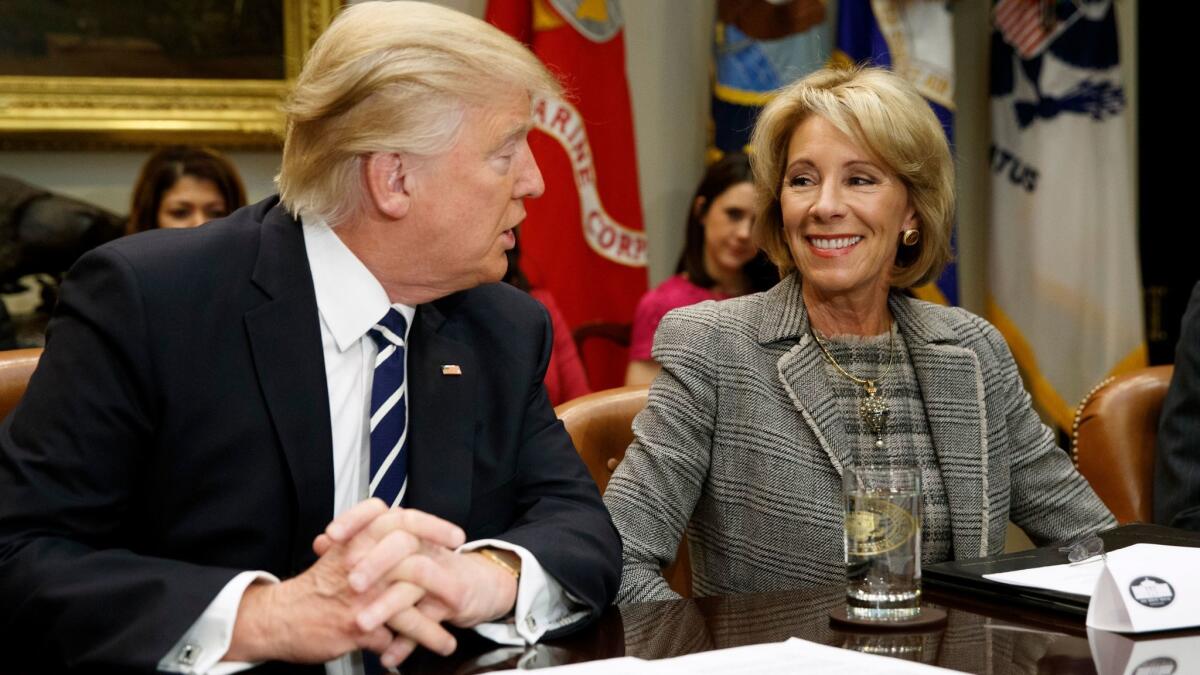Editorial: The hefty price of Trump’s school-choice fantasy

- Share via
Politicians like to say that the federal government should keep its hands off schools — until they want to interfere. Take President Trump, for example. On the campaign trail he vowed to end the tight federal control of schools that characterized the Obama administration. No more using federal money to push states into adopting the Common Core curriculum standards, he said. In fact, he vowed, he’d eliminate Common Core — which actually would amount to improper interference on its own because states have the right to set their own curriculum standards.
But power and a big budget are heady things, especially to the current president. So it shouldn’t surprise anyone that Trump’s draft education budget, obtained by the Washington Post, would misuse $1.4 billion worth of federal tax dollars to bend states and school districts to his vision of education, especially when it comes to promoting private-school vouchers and charter schools. That money would come at the expense of many more worthy ideas.
Vouchers, as this page has said many times before, misuse public money for private educational enterprises, provide too little accountability and pose church-state separation issues, among other problems. Charter schools, on the other hand, can be a boon to families and students, as they largely have been in Los Angeles. But in many areas of the country, where for-profit charter schools are prevalent and oversight is nearly nonexistent, these publicly funded but privately managed schools often perform no better, and in many cases worse, than traditional public schools. And Trump and Education Secretary Betsy DeVos haven’t launched any efforts thus far to ensure the quality of charter schools, which would get 50% more federal aid than before under the draft budget.
Cutting aid to public schools in order to push vouchers would especially harm Trump’s voter base in the heartland.
The new spending on vouchers, charters and “school-choice” policies was more than offset in the draft budget, the Post reported, by $10.6 billion in cuts to other, more effective and valuable education programs. Some are high priorities for Republicans as well as Democrats — science and tech education, career training, literacy programs that are of immediate and practical value. Teacher training also would be targeted, despite widespread, longstanding agreement about how important good teachers are to educational success. Money that Congress recently allocated — to allow schools to pay for better physical education, anti-bullying programs and Advanced Placement courses that enable students to earn college credits while still in high school — would be axed.
And funding for the most vulnerable students and their families would be undercut in multiple ways under the draft budget. Federally funded after-school programs that keep 1.6 million American kids safe and provide wholesome activities would vanish. Though Title I funding for low-income students would be preserved, it would be reformulated so that less of the money would go to the schools with the highest concentrations of disadvantaged students, where it is needed the most. Aid for college work-study programs would be slashed by half. Also on the chopping block: $15 million that helps low-income parents afford child care while attending college. Doesn’t our society want to encourage parents to better their lives through higher education, and to support themselves while doing so?
One odd thing about Trump’s proposal: Cutting aid to public schools in order to push vouchers would especially harm Trump’s voter base in the heartland. With few private schools, rural states tend to rely heavily on their public schools.
Release of the official budget is slated for May 23, and Trump is expected to propose eviscerating cuts in many other programs as he seeks to boost defense spending, scale back domestic programs and cut taxes. And while Democrats are likely to oppose him across the board, the resistance on the education cuts could well be bipartisan — lawmakers aren’t likely to favor cutting programs that they called for less than a year and a half ago as part of the Every Student Succeeds Act, which replaced No Child Left Behind. Their constituents would also have plenty to say about chopping programs that aid the public schools on which they depend so that the president can have more money to leave his school-choice stamp on local districts.
Follow the Opinion section on Twitter @latimesopinion and Facebook
More to Read
A cure for the common opinion
Get thought-provoking perspectives with our weekly newsletter.
You may occasionally receive promotional content from the Los Angeles Times.









